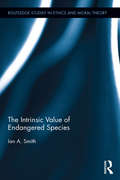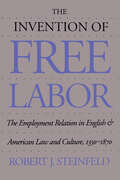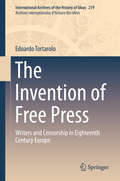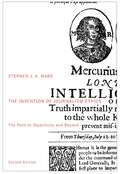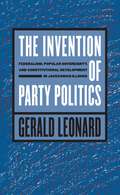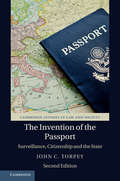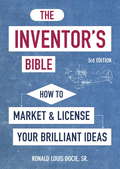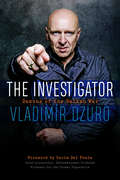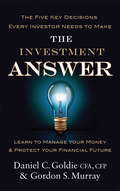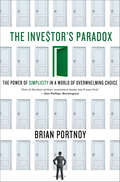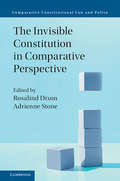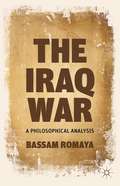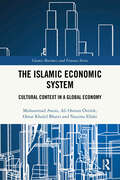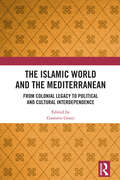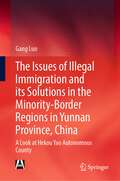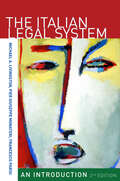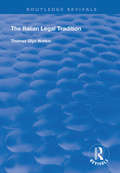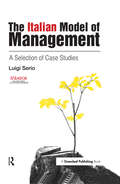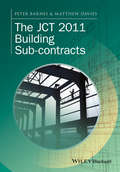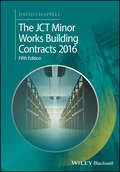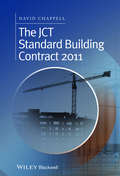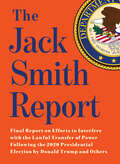- Table View
- List View
The Intrinsic Value of Endangered Species (Routledge Studies in Ethics and Moral Theory)
by Ian A. SmithWhy save endangered species without clear aesthetic, economic, or ecosystemic value? This book takes on this challenging question through an account of the intrinsic goods of species. Ian A. Smith argues that a species’ intrinsic value stems from its ability to flourish—its organisms continuing to reproduce successfully and it avoiding extinction—which helps to demonstrate a further claim, that humans ought to preserve species that we have endangered. He shows our need to exercise humility in our relations with endangered species through the preservation of their intrinsic goods, which in turn rectifies our degradation of their importance. Unique in its appeal to virtue ethics and to species concepts, The Intrinsic Value of Endangered Species is an important resource for scholars working in environmental ethics and the philosophy of biology.
The Invention of Free Labor
by Robert J. SteinfeldExamining the emergence of the modern conception of free labor--labor that could not be legally compelled, even though voluntarily agreed upon--Steinfeld explains how English law dominated the early American colonies, making violation of al labor agreements punishable by imprisonment. By the eighteenth century, traditional legal restrictions no longer applied to many kinds of colonial workers, but it was not until the nineteenth century that indentured servitude came to be regarded as similar to slavery.
The Invention of Free Press
by Edoardo TortaroloTracking the relationship between the theory of press control and the realities of practicing daily press censorship prior to publication, this volume on the suppression of dissent in early modern Europe tackles a topic with many elusive and under-researched characteristics. Pre-publication censorship was common in absolutist regimes in Catholic and Protestant countries alike, but how effective it was in practice remains open to debate. The Netherlands and England, where critical content segued into outright lampoonery, were unusual for hard-wired press freedoms that arose, respectively, from a highly competitive publishing industry and highly decentralized political institutions. These nations remained extraordinary exceptions to a rule that, for example in France, did not end until the revolution of 1789. Here, the author's European perspective provides a survey of the varying censorship regulations in European nations, as well as the shifting meanings of 'freedom of the press'. The analysis opens up fascinating insights, afforded by careful reading of primary archival sources, into the reactions of censors confronted with manuscripts by authors seeking permission to publish. Tortarolo sets the opinions on censorship of well-known writers, including Voltaire and Montesquieu, alongside the commentary of anonymous censors, allowing us to revisit some common views of eighteenth-century history. How far did these writers, their reasoning stiffened by Enlightenment values, promote dissident views of absolutist monarchies in Europe, and what insights did governments gain from censors' reports into the social tensions brewing under their rule? These questions will excite dedicated researchers, graduate students, and discerning lay readers alike.
The Invention of Journalism Ethics, Second Edition: The Path to Objectivity and Beyond (McGill-Queen's Studies in the History of Ideas #107)
by Stephen WardAn innovative theory of pragmatic objectivity to guide journalism today.
The Invention of Party Politics
by Gerald LeonardThis ambitious work uncovers the constitutional foundations of that most essential institution of modern democracy, the political party. Taking on Richard Hofstadter's classic The Idea of a Party System, it rejects the standard view that Martin Van Buren and other Jacksonian politicians had the idea of a modern party system in mind when they built the original Democratic party.Grounded in an original retelling of Illinois politics of the 1820s and 1830s, the book also includes chapters that connect the state-level narrative to national history, from the birth of the Constitution to the Dred Scott case. In this reinterpretation, Jacksonian party-builders no longer anticipate twentieth-century political assumptions but draw on eighteenth-century constitutional theory to justify a party division between "the democracy" and "the aristocracy." Illinois is no longer a frontier latecomer to democratic party organization but a laboratory in which politicians use Van Buren's version of the Constitution, states' rights, and popular sovereignty to reeducate a people who had traditionally opposed party organization. The modern two-party system is no longer firmly in place by 1840. Instead, the system remains captive to the constitutional commitments on which the Democrats and Whigs founded themselves, even as the specter of sectional crisis haunts the parties' constitutional visions.
The Invention of the Passport: Surveillance, Citizenship and the State (Cambridge Studies in Law and Society)
by John C. TorpeyThis book presents the first detailed history of the modern passport and why it became so important for controlling movement in the modern world. It explores the history of passport laws, the parliamentary debates about those laws, and the social responses to their implementation. The author argues that modern nation-states and the international state system have 'monopolized the 'legitimate means of movement',' rendering persons dependent on states' authority to move about - especially, though not exclusively, across international boundaries. This new edition reviews other scholarship, much of which was stimulated by the first edition, addressing the place of identification documents in contemporary life. It also updates the story of passport regulations from the publication of the first edition, which appeared just before the terrorist attacks of 9/11, to the present day.
The Inventor's Bible, 3rd Edition
by Ronald Louis DocieThe Definitive Guide for Inventors Features the PATENT AND NEW PRODUCT MARKETING WORKBOOK that takes you step-by-step through: * Protecting Your Idea (choosing the right steps)* Patenting (how, when, and why)* Selecting Manufacturers (that will do the best job)* Finding the Best Markets (and expanding opportunities)* Developing a Strategy and Market Plan (that fits perfectly into business plans)* Presenting Your Invention to Companies (without getting ripped off)* Negotiating the Best Deal (and how to hire the best advisors)From the Trade Paperback edition.
The Investigator: Demons of the Balkan War
by Vladimír DzuroThe war that broke out in the former Yugoslavia at the end of the twentieth century unleashed unspeakable acts of violence committed against defenseless civilians, including a grizzly mass murder at an Ovčara pig farm in 1991. An international tribunal was set up to try the perpetrators of crimes such as this, and one of the accused was Slavko Dokmanović, who at the time was the mayor of a local town. Vladimír Dzuro, a criminal detective from Prague, was one of the investigators charged with discovering what happened on that horrific night at Ovčara. The story Dzuro presents here, drawn from his daily notes, is devastating. It was a time of brutal torture, random killings, and the disappearance of innocent people. Dzuro provides a gripping account of how he and a handful of other investigators picked up the barest of leads that eventually led them to the gravesite where they exhumed the bodies. They were able to track down Dokmanović, only to find that taking him into custody was a different story altogether. The politics that led to the war hindered justice once it ended. Without any thoughts of risk to their own personal safety, Dzuro and his colleagues were determined to bring Dokmanović to justice. In addition to the story of the pursuit and arrest of Dokmanović, The Investigator provides a realistic picture of the war crime investigations that led to the successful prosecution of a number of war criminals. Visit warcrimeinvestigator.com for more information or watch a book trailer.
The Investment Answer: Learn to manage your money and protect your financial future
by Gordon Murray Daniel GoldieThe good news is that people today expect to live longer, healthier lives. The bad news is that many of us will not have enough money to retire comfortably. The solution to this problem is wise investment of the wealth we accumulate during our working lives, but the unfortunate truth is that when it comes to investment, many of us don't know where to start.Daniel Goldie and Gordon Murray aim to change the way we think about investing and influence the way we select financial advisors, invest our money and assess the results.In THE INVESTMENT ANSWER they provide readers with the necessary background to make the five key decisions that have a significant impact on the overall investment experience so that they will never again be afraid of financial markets or uncertain about what to do with their money.
The Investor's Paradox: The Power of Simplicity in a World of Overwhelming Choice
by Brian PortnoyInvestors are in a jam. A troubled global economy, unpredictable markets, and a bewildering number of investment choices create a dangerous landscape for individual and institutional investors alike. To meet this challenge, most of us rely on a portfolio of fund managers to take risk on our behalves. Here, investment expert Brian Portnoy delivers a powerful framework for choosing the right ones – and avoiding the losers.Portnoy reveals that the right answers are found by confronting our own subconscious biases and behavioral quirks. A paradox we all face is the natural desire for more choice in our lives, yet the more we have, the less satisfied we become – whether we're at the grocery store, choosing doctors, or flipping through hundreds of TV channels. So, too, with investing, where there are literally tens of thousands of funds from which to choose. Hence "the investor's paradox": We crave abundant investment choices to conquer volatile markets, yet with greater flexibility, the more overwhelmed and less empowered we become.Leveraging the fresh insights of behavioral economics, Portnoy demystifies the opaque world of elite hedge funds, addresses the limits of mass market mutual funds, and discards the false dichotomy between "traditional" and "alternative" investments. He also explores why hedge funds have recently become such a controversial and disruptive force. Turns out it's not the splashy headlines – spectacular trades, newly minted billionaires, aggressive tactics – but something much more fundamental. The stratospheric rise to prominence and availability of alternative strategies represents a further explosion in the size and complexity of the choice set in a market already saturated with products. It constitutes something we all both crave and detest.The Investor's Paradox lights a path toward simplicity in a world of dangerous markets and overwhelming choice. Written in accessible, jargon-free language, with a healthy skepticism of today's money management industry, it offers not only practical tools for investment success but also a message of empowerment for investors drowning in possibility.
The Invisible Constitution in Comparative Perspective (Comparative Constitutional Law and Policy)
by Rosalind Dixon Adrienne StoneConstitutions worldwide inevitably have 'invisible' features: they have silences and lacunae, unwritten or conventional underpinnings, and social and political dimensions not apparent to certain observers. The Invisible Constitution in Comparative Perspective helps us understand these dimensions to contemporary constitutions, and their role in the interpretation, legitimacy and stability of different constitutional systems. This volume provides a nuanced theoretical discussion of the idea of 'invisibility' in a constitutional context, and its relationship to more traditional understandings of written versus unwritten constitutionalism. Containing a rich array of case studies, including discussions of constitutional practice in Australia, Canada, China, Germany, Hong Kong, Israel, Italy, Indonesia, Ireland and Malaysia, this book will look at how this aspect of 'invisible constitutions' is manifested across different jurisdictions.
The Invisible Woman: Gender, Crime, and Justice (Fourth Edition) (Wadsworth Contemporary Issues in Crime and Justice)
by Joanne BelknapTHE INVISIBLE WOMAN: GENDER, CRIME, AND JUSTICE is the definitive guide on women and the criminal justice system, focusing on female offenders and their treatment by the criminal justice system, female victims of crime, and female employees of criminal justice system agencies. Thoroughly updated with new research and statistics, the fourth edition covers such timely and important topics as restorative justice, gender-responsive programming, sex trafficking, pathways research, Intimate Partner Abuse (IPA)/Domestic Violence (DV), and stalking.
The Iraq War
by Bassam RomayaThis book features a critique of key philosophical doctrines that dominate the Iraq war debate: just war theory, humanitarian intervention, democratic realism, and preventive war doctrine. The author evaluates each and develops a philosophical approach that offers a model for thinking through the philosophical dilemmas introduced by new wars.
The Ironies of Colonial Governance: Law, Custom and Justice in Colonial India (Cambridge Studies in Law and Society)
by James JaffeThe Indian village council, or panchayat, has long held an iconic place in India. Ironies of Colonial Governance traces the history of that ideal and the attempts to adapt it to colonial governance. Beginning with an in-depth analysis of British attempts to introduce a system of panchayat governance during the early nineteenth century, it analyses the legacies of these actions within the structures of later colonial administrations as well as the early nationalist movement. Particular attention is paid to the ways in which the ideologies of panchayat governance evolved during this period and to the transnational exchange and circulation of panchayat ideologies. Analyses colonial law within a transnational perspective, thereby providing a comparative imperial perspective on the evolution of law and justice. Combines the history of ideas and the history of colonial administration in order to illustrate the imperial circulation of ideas and trace the ideological sources of colonial law and administration. Focuses on the ideological and practical changes in the perceptions of customary law, customary courts and local administration within India, making this of interest to those seeking to understand how ideas affect practice in colonial administration as well as how practice affected ideology.
The Islamic Economic System: Cultural Context in a Global Economy (Islamic Business and Finance Series)
by Muhammad Awais Ali Osman Öztürk Omar Khalid Bhatti Nazima EllahiIslamic Economics refers to financial aspects or monetary activities and processes, which adhere to Islamic standards and teachings. The Islamic Economic System relates to the hypothetical development of an economy whose individuals follow the Islamic faith. This book presents an interesting and timely narrative of the concepts of Islamic economics in the context of Islamic culture. Its purpose is to guide individuals and organizations towards a Shariah-based Islamic Economic System.It begins by introducing the Islamic Economic System; its historical origins are explained in the framework of the verses of the Holy Quran, and in light of the Shariah scholars and the philosophical thinkers of the mid-20th century. It discusses concepts such as the evolution of Islamic Fintech and Artificial Intelligence (AI); the relationship between Islamic corporate governance and Islamic Economics; the distribution of wealth in Islam; Islamic Social Finance; Islamic Economic practices in the banking industry, behavioural norms and moral foundations; and Islamic Economics in Organisation of Islamic Cooperation (OIC) and non-OIC countries. The author emphasizes the principles that set Islamic economics apart from traditional systems, grounded in Shariah evidence and highlights the role of Islamic principles in promoting overall business success and ethical practices in the banking industry, offering comparative analysis between Islamic and conventional models, as well as economic systems. Drawing on a rich array of sources, including the Quran and interviews with renowned religious scholars, the book provides a well-rounded and thoroughly researched argument.This book will serve as a valuable resource for academics, scholars, researchers, and organizations seeking to navigate the complexities of an interest-free economic system guided by Islamic principles.
The Islamic World and the Mediterranean: From Colonial Legacy to Political and Cultural Interdependence
by Gustavo GozziThis collection investigates the conflictual relationship between the Islamic world and Western civilization, looking at its history as key to understanding its present. The historical narrative starts from the controversial encounter that took place at the close of the 18th century, the effort being to improve our understanding of that engagement and its current implications, focusing in particular on how it has affected law, philosophy, and religion. The subsequent age of 19th-century colonialism is analysed with a view to understanding the currents of mutual influence that throughout that era ran between Islam and the Western world, looking at the law and the institutions, as well as at different strains in the culture. This discussion provides the backdrop against which the book turns a critical eye on current Euro-Mediterranean relations, highlighting the need to move beyond the conditionality principle that has traditionally been a cornerstone of European policy toward Arab Muslim peoples and to set this relationship on a new foundation, one that recognizes the interdependency between these two areas, making it possible to open up a Mediterranean space of mutual recognition among all its peoples. The book will be of interest to researchers and academics working in the areas of legal and political history, comparative law, legal philosophy, law and religion, and Islamic studies.
The Israeli Supreme Court and the Human Rights Revolution
by Assaf MeydaniThis book explains the reciprocal relations between the Supreme Court and the Israeli political system. It is based on a unique approach that contends that the non-governability of the political system and an alternative political culture are two key formal and informal variables affecting the behavior of several political players within the Israeli arena. The analysis illustrates the usefulness of such a model for analyzing long-term socio-political processes and explaining the actions of the players. Until this model changes significantly, the decisions of the High Court of Justice express the values of the state and enable Israel to remain a nation that upholds human rights. The court's decisions determine the normative educational direction and reflect Israel's democratic character with regard to the values of human rights.
The Issues of Illegal Immigration and its Solutions in the Minority-Border Regions in Yunnan Province, China: A Look at Hekou Yao Autonomous County
by Gang LuoThis book analyzes the governance of illegal immigrants in ethnic areas along China’s southwest border. Since China is not an immigrant country and lacks an immigrant culture, the goals of law enforcement departments are limited to sanfeirenyuan (three types of illegal persons: illegal immigrants, illegal residents, and illegal employees). The transformation of sanfeirenyuan, an issue that has plagued China for many years, into an “illegal immigration” governance issue that is of general concern to the international community, has led to fundamental changes in research methods and research topics. The research presented here makes the issue China now faces part of global issues; by using the “worldview on China’s issues” to assess current problems, it can also show how “China’s solutions can be applied to global issues.” The unique feature of this book is that it approaches the issue of illegal immigration as an unconscious crisis. Accordingly, it holds substantial value in terms of exploring the theoretical basis of and governance methods for maintaining national security in the context of globalization, as well as the early warning mechanisms and crisis management in the context of China’s national security. Since China has a long southwest border, the stability and security of border ethnic areas have long played a decisive role in the stability and security of the country as a whole: if the frontiers are stable, the country enjoys enhanced security. Consequently, investigating the governance mechanism for illegal immigrants in the ethnic areas of the southwest border is of considerable practical relevance. This book offers a valuable asset for researchers in related fields and can be used as a reference book for students of national security. It also benefits practitioners in relevant management departments.
The Italian Legal System: An Introduction, Second Edition
by Michael A. Livingston Francesco Parisi Pier Giuseppe MonateriFor fifty years, the first edition of The Italian Legal System has been the gold standard among English-language works on the Italian legal system. The book's original authors, Mauro Cappelletti, John Henry Merryman, and Joseph M. Perillo, provided not only an overview of Italian law, but a definition of the field, together with an important contribution to the general literature on comparative law. The book explains the unique "Italian style" in doctrine, law, and interpretation and includes an extremely well-written introduction to Italian legal history, government, the legal profession, and civil procedure and evidence. In this fully-updated and revised second edition, authors Michael A. Livingston, Pier Giuseppe Monateri, and Francesco Parisi describe the substantial changes in Italian law and society in the intervening five decades--including the creation and impact of the European Union, as well as important advances in comparative law methodology. The second edition poses timely, relevant questions of whether and to what extent the unique Italian style of law has survived the pressures of European unification, American influence, and the globalization of law and society in the intervening period. The Italian Legal System, Second Edition is an important and stimulating resource for those with specific interest in Italy and those with a more general interest in comparative law and the globalization process.
The Italian Legal Tradition (Routledge Revivals)
by Thomas Glyn WatkinFirst published in 1997, this volume provides the reader from a common law background with an introduction to the Legal System and basic private law institutions of contemporary Italy. It aims to afford a basic understanding, rather than a detailed presentation, of Italian law, through an appreciation of its historical development within the civil law tradition and its place in that family of legal systems descended from Roman law. Having described Italy’s place in European legal history and identified the main features of civil law systems generally, it examines the structure of the modern Italian State, its legislative process. Constitution, legal professions and systems of civil, criminal and administrative justice. The last third is devoted to private law, in particular the law relating to the family, property, contracts and civil wrongs, particular attention being paid to differences between the civil and common law approaches to these subjects. It is a readable, lucid and systematic account of its subject.
The Italian Model of Management: A Selection of Case Studies
by Luigi SerioThis book is an essential resource for facilitators seeking to help students develop their knowledge of management practice in Italy. It presents a collection of the best case studies and accompanying teaching notes from the Italian Association for Management Development (ASFOR) competition in 2014. The cases are written by teachers across many of the members of ASFOR in Italy, leading business schools, corporate universities and academia. Knowledge gained by professionals often remains implicit and is rarely shared. By grouping together the award-winning case studies in this volume, readers can gain an important insight into how management is conducted in Italy. This collection shines a light on management practices across several industries. The Italian economy differs from others in that it is one in which small and family-run businesses dominate, and the relationship between the private sector and public life is unique. As a result, The Italian Model of Management provides the opportunity for students to enlarge the Anglo-Saxon model and perspective of management, and to offer cross-cultural learning experiences, based on the distinction of a “Made in Italy” competitive advantage. Each case provides an engaging story, plots the strategic development of the organization in question, and is supported by online teaching guidance and teaching notes.
The JCT 2011 Building Sub-contracts
by Peter Barnes Matthew DaviesThe majority of construction work is carried out by sub-contractors, and the JCT 2011 suite of contracts has a full range of sub-contracts to cover these works. As building projects become more complex, sub-contractors need to become more familiar with the agreements they sign. Written to help the busy subcontractor deal effectively with the range of subcontracts they will encounter, The JCT 2011 Building Subcontracts looks at the key contract conditions, considers the rights and obligations of the parties and how risk is allocated, and discusses the main practical problems that arise when using these subcontracts. The authors have written the book to be as accessible as possible to ensure the material is easy for the busy subcontractor to assimilate and use.
The JCT Minor Works Building Contracts 2016
by David ChappellThe revised and updated edition of this classic book on the JCT Minor Works Building Contracts The JCT Minor Works Building Contracts 2016 offers a concise overview of this agreement, which continues to be the most popular JCT contract, as it used on the sorts of small works that most architects and builders encounter routinely. Written in straightforward terms, the book is formatted in short chapters with accessible sub-headings, and the author avoids legal and pseudo-legal wording where possible. Some explanations from first principles are included where it is thought they would be helpful and occasionally, where the precise legal position is unclear, the author uses his significant experience to offer a view. Overall, the information is presented in a manner that it is easy to understand, use and reference. The 2016 edition of the contract contains a great many changes from previous editions and these are all covered. For example, the book includes information about the substantially revised payment provisions, changes to those parts dealing with insurance, variation instructions, the CDM Regulations, Supplemental Provisions, definitions, and the Contractor's Designed Portion. In summary, this fifth edition has been comprehensively revised and updated to: Ensure the discussion is easy to comprehend and use by busy architects and contractors Include a Include a number of tables and flowcharts to assist in understanding the way the contract operates Include several letter templates that can be used in common situations Provide answers to the sorts of problems that commonly arise in the course of a building project The new edition of this classic book on The JCT Minor Works Building Contracts will be an ideal tool for busy architects and contractors who need to find what to do when problems arise on projects using this contract.
The JCT Standard Building Contract 2011
by David ChappellBooks about construction contracts tend to be dense and wordy, but what most architects, quantity surveyors, project managers, builders and employers are looking for is an easily navigable, simple guide to using a contract, written in plain language. The JCT Standard Building Contract 2011 is an uncomplicated book about a complex and commonly used contract. It straightforwardly and concisely sets out exactly what the contract requires in various circumstances, as far as possible without legal jargon and without assuming any particular legal or contractual expertise from the reader. It explains, often from first principles, exactly what is meant by a contract and why certain clauses, such as extension of time clauses or liquidated damages clauses are present and more importantly, what they mean. The book is divided into many chapters, each with many sub-headings, to make it easy to read and to help readers to find relevant explanations quickly. Tables and flowcharts are used to ensure clarity and most chapters include a section dealing with common problems. Covers the recently issued JCT Standard Building Contract 2011 Straightforward, concise, and as far as possible free of legal jargon Sets out exactly what the contract requires in various circumstances Includes many tables and flowcharts to ensure clarity
The Jack Smith Report: Final Report on Efforts to Interfere with the Lawful Transfer of Power Following the 2020 Presidential Election by Donald Trump and Others
by Jack SmithThe full, unexpurgated final report of special prosecutor Jack Smith, regarding his two-year investigation of Donald Trump for attempting to overturn the results of the 2020 presidential election.The evidence from the investigation includes grand jury testimony from 55 witnesses, interviews by Smith&’s criminal investigators with over 250 people, photographs, information from electronic devices and online records—including Trump&’s social media account—and more.&“Our work rested upon the fundamental value of our democracy that we exist as &‘a government of laws, and not of men . . .&’ Simply put: the Department of Justice&’s guiding mandate, which my Office strove to uphold, is that power, politics, influence, status, wealth, fear, and favor should not impede justice under the law . . . My Office had one north star: to follow the facts and law wherever they led. Nothing more and nothing less . . . But for Mr. Trump&’s election and imminent return to the Presidency, the Office assessed that the admissible evidence was sufficient to obtain and sustain a conviction at trial.&” —From Jack Smith&’s Cover Letter to Attorney General Merrick GarlandThe Jack Smith Report continues Melville House's "tradition of publishing pivotal public documents."—The New York Times
